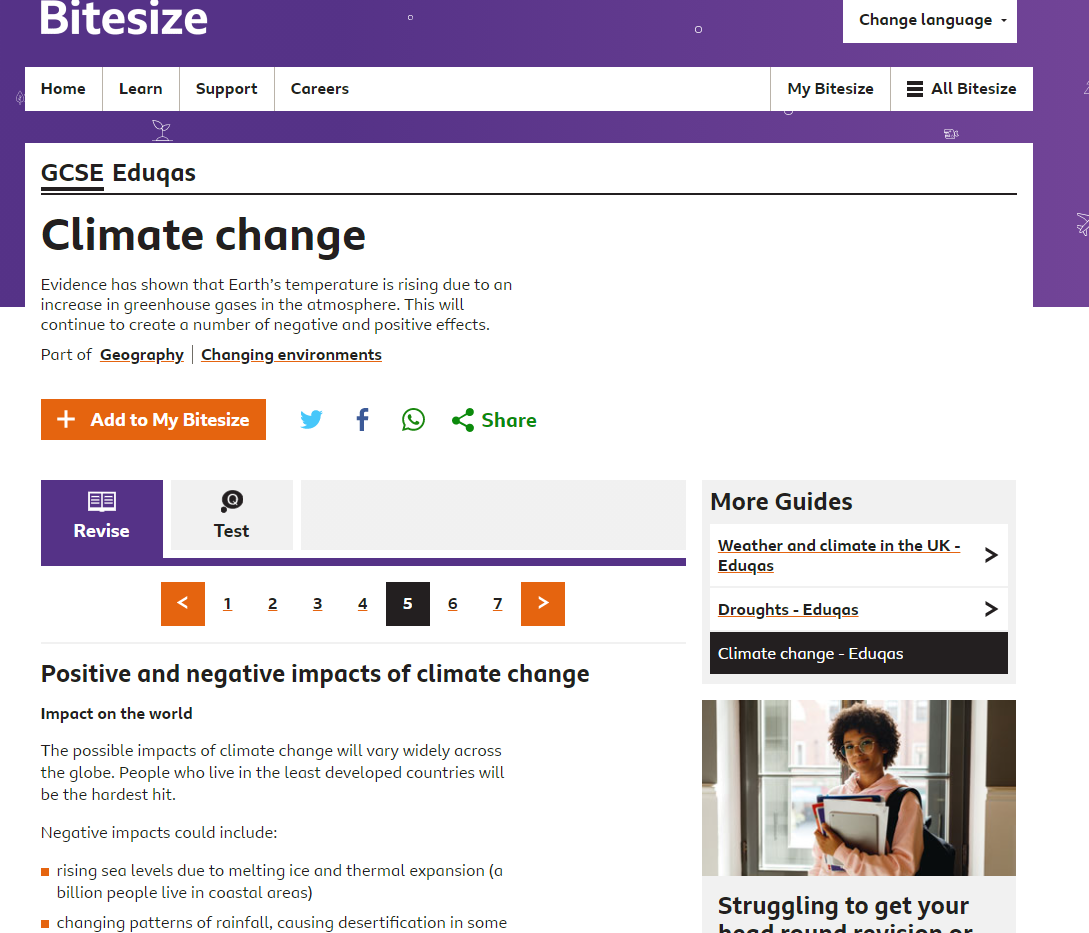‘An absolute disgrace’: BBC Bitesize condemned for listing ‘positive’ impacts of climate crisis
Online study guide ‘could have been written by Exxon,’ say critics

Your support helps us to tell the story
From reproductive rights to climate change to Big Tech, The Independent is on the ground when the story is developing. Whether it's investigating the financials of Elon Musk's pro-Trump PAC or producing our latest documentary, 'The A Word', which shines a light on the American women fighting for reproductive rights, we know how important it is to parse out the facts from the messaging.
At such a critical moment in US history, we need reporters on the ground. Your donation allows us to keep sending journalists to speak to both sides of the story.
The Independent is trusted by Americans across the entire political spectrum. And unlike many other quality news outlets, we choose not to lock Americans out of our reporting and analysis with paywalls. We believe quality journalism should be available to everyone, paid for by those who can afford it.
Your support makes all the difference.BBC Bitesize has been condemned as an “absolute disgrace” for publishing a list of the “positive” effects of global warming.
A GCSE study aide on the educational website features a bullet-pointed list of “positive and negative impacts of climate change”.
Among the points put forward as positive are “warmer temperatures and increased CO2 levels, leading to more vigorous plant growth,” and “more resources, such as oil, becoming available in places such as Alaska and Siberia when the ice melts”.
The study resource also suggested that “frozen regions, such as Canada” would be more able to grow crops thanks to global warming.
Critics drew attention to the page as unprecedented and deadly heatwave in Canada fuels raging wildfires.
The study resource says that evidence has shown the Earth’s temperature is rising because of an increase in greenhouse gases in the atmosphere, which will “continue to create a number of positive and negative effects”.
While 10 “negative” impacts are listed first, including rising sea levels, desertification and flooding, species extinction, frequent extreme weather events and climate migration, the page then goes on to list 10 “positive” effects.
Other so-called positive impacts include new shipping routes becoming available and new tourist destinations opening up.
Critics said the exam guidance promoted false balance on climate issues.
The environmental writer George Monbiot tweeted: “This is what BBC bitesize is teaching our children about climate breakdown. I’m sorry, but it’s an absolute disgrace. You could come away thinking: ‘on balance, it sounds pretty good.’ It could have been written by Exxon”.
The BBC said it had reviewed the content on the page in response to criticism and would make amendments.
The list goes on to cite positive and negative aspects of climate change for the UK. The 10 negative elements include the loss of valuable farmland to rising sea levels and flooding, increased incidence of flooding and droughts, increased demand for water supplies, the extinction of certain plant species in Scotland, and the closure of Scottish ski resorts due to a lack of snow.
A list of seven “positive” impacts in the UK includes a longer crop growing season due to higher year-round temperatures, reduced winter heating costs, and growth in the UK tourist industry.
Extinction Rebellion’s South East group: “GCSE students, young people, those facing future disasters, deserve better than to be judged on questions which warp and distort the truth.”
Stuart Lock, chief executive of Bedford schools trust Advantage Schools, said the advice was “flat wrong, doesn’t align with the national curriculum or exam specs, and needs reconsidering”.
“Climate change isn’t a ‘both sides’ argument,” he added.
A BBC spokesperson said: “We have reviewed the page and are amending the content to be in line with current curricula.”
Bitesize is a free only study guide for school-age pupils across the UK, intended to help students in their day-to-day school work and exams. The programming across the online platform was expanded during lockdown to ensure that parents and children had access to resources to keep them on track and learning.
In 2018 the BBC officially took a stand on the climate crisis, stating that “man-made climate change exists” and warned journalists to be aware of “false balance”. A related policy document stated: “As climate change is accepted as happening, you do not need a ‘denier’ to balance the debate.”
It came after the broadcaster was repeatedly criticised for inviting climate change deniers to be interviewed about environmental issues.
Join our commenting forum
Join thought-provoking conversations, follow other Independent readers and see their replies
Comments